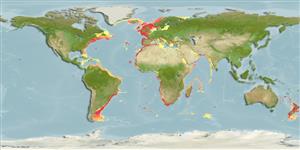Preferred temperature (Ref.
115969): 5.2 - 19, mean 9.4 (based on 672 cells).
Fylogenetische diversiteitsindex (Ref.
82804): PD
50 = 0.8125 [Uniqueness, from 0.5 = low to 2.0 = high].
Bayesian length-weight: a=0.01318 (0.00968 - 0.01796), b=3.00 (2.91 - 3.09), in cm Total Length, based on LWR estimates for this species (Ref.
93245).
Trofisch niveau (Ref.
69278): 4.1 ±0.64 se; based on food items.
Weerstandsvermogen (Ref.
120179): laag, minimale populatieverdubbelingstijd 4,5-14 jaar (K=0.05-0.08; tmax=76; tm=9-10 yrs estimated from VBGF; Fec=3 million).
Fishing Vulnerability (Ref.
59153): Very high vulnerability (78 of 100).
Climate Vulnerability (Ref.
125649): Moderate to high vulnerability (50 of 100).
